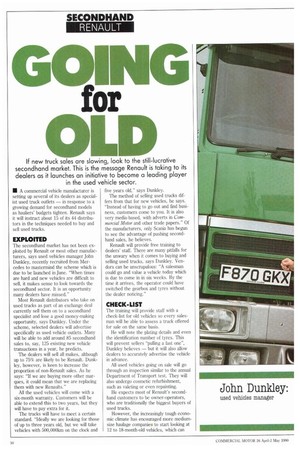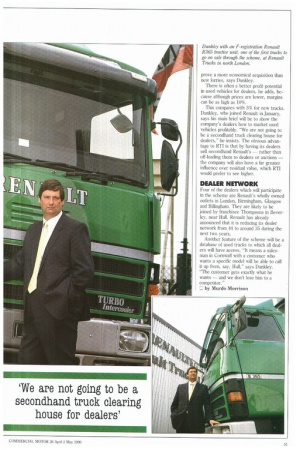GIG
Page 76

Page 77

If you've noticed an error in this article please click here to report it so we can fix it.
)forti
COLD If new truck sales are slowing, look to the still-lucrative secondhand market. This is the message Renault is taking to its dealers as it launches an initiative to become a leading player in the used vehicle sector.
I/ A commercial vehicle manufacturer is setting up several of its dealers as specialist used truck outlets — in response to a growing demand for secondhand models as hauliers' budgets tighten. Renault says it will instruct about 15 of its 44 distributors in the techniques needed to buy and sell used trucks.
EXPLOITED
The secondhand market has not been exploited by Renault or most other manufacturers, says used vehicles manager John Dunkley, recently recruited from Mercedes to mastermind the scheme which is due to be launched in June. "When times are hard and new vehicles are difficult to sell, it makes sense to look towards the secondhand sector. It is an opportunity many dealers have missed."
Most Renault distributors who take on used trucks as part of an exchange deal currently sell them on to a secondhand specialist and lose a good money-making opportunity, says Dunkley. Under the scheme, selected dealers will advertise specifically as used vehicle outlets. Many will be able to add around 85 secondhand sales to, say, 125 existing new vehicle transactions in a year, he predicts.
The dealers will sell all makes, although up to 75% are likely to be Renault. Dunkley, however, is keen to increase the proportion of non-Renault sales. As he says: "If we are buying more other marques, it could mean that we are replacing them with new Renaults."
All the used vehicles will come with a six-month warranty. Customers will be able to extend this to two years, but they will have to pay extra for it.
The trucks will have to meet a certain standard. "Ideally we are looking for those of up to three years old, but we will take vehicles with 500,000km on the clock and five years old," says Dunkley.
The method of selling used trucks differs from that for new vehicles, he says. "Instead of having to go out and find business, customers come to you. It is also very media-based, with adverts in Commercial Motor and other trade papers." Of the manufacturers, only Scania has begun to see the advantage of pushing secondhand sales, he believes.
Renault will provide free training to dealers' staff. There are many pitfalls for the unwary when it comes to buying and selling used trucks, says Dunkley. Vendors can he unscrupulous: "A salesman could go and value a vehicle today which is due to come in in six weeks. By the time it arrives, the operator could have switched the gearbox and tyres without the dealer noticing."
CHECK-LIST
The training will provide staff with a check-list for old vehicles so every salesman will be able to assess a truck offered for sale on the same basis.
He will note the plating details and even the identification number of tyres. This will prevent sellers "pulling a fast one", Dunkley believes — but it will also allow dealers to accurately advertise the vehicle in advance.
All used vehicles going on sale will go through an inspection similar to the annual Department of Transport test. They will also undergo cosmetic refurbishment, such as valeting or even repainting.
He expects most of Renault's secondhand customers to be owner-operators, who are traditionally the biggest buyers of used trucks.
However, the increasingly tough economic climate has encouraged more mediumsize haulage companies to start looking at 12 to 18-month-old vehicles, which can prove a more economical acquisition than new lorries, says Dunkley.
There is often a better profit potential in used vehicles for dealers, he adds, because although prices are lower, margins can be as high as 10%.
This compares with 3% for new trucks. Dunkley, who joined Renault in January, says his main brief will be to show the company's dealers how to market used vehicles profitably. "We are not going to be a secondhand truck clearing house for dealers," he insists. The obvious advantage to RT1 is that by having its dealers sell secondhand Renault's — rather than off-loading them to dealers or auctions — the company will also have a far greater influence over residual value, which RTI would prefer to see higher.
DEALER NETWORK
Four of the dealers which will participate in the scheme are Renault's wholly owned outlets in London, Birmingham, Glasgow and BiHingham. They are likely to be joined by franchisee Thompsons in Beverley, near Hull. Renault has already announced that it is reducing its dealer network from 44 to around 35 during the next two years.
Another feature of the scheme will be a database of used trucks to which all dealers will have access. "It means a salesman in Cornwall with a customer who wants a specific model will be able to call it up from, say, Hull," says Dunkley. The customer gets exactly what he wants — and we don't lose him to a competitor."
Iii by Murdo Morrison
























































































































